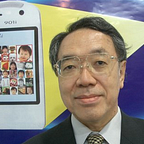On Expanded Password System
Below are some of my recent writings on the merits of Expanded Password System.
Who AdoptedExpanded Password System (EPS)and for What
Secret Credentialand Computing Power
EPS for SSI(Self-Sovereign Identity)
‘Easy-to-Remember’ is one thing. ‘Hard-to-Forget’ is another — The observation that Images are easy to remember has been known for many decades; it is not our theme.
What we discuss is that ‘images of our emotion-coloured episodic memory’ is ‘Hard to Forget’ to the extent that it is ‘Panic-Proof’; images of toys, dolls, dogs and cats, for example, that our children used to love for years would jump into our eye even when we are placed in heavy pressure and caught in severe panic.
Expanded Password System (EPS), which accepts images, especially the unforgettable images of our own emotion-coloured episodic memory, as well as conventional characters and numbers, is intended to be a legitimate successor to the time-honored seals, autographs and text-only password systems for safe digital identity over many generations to come, In the present-day world, safely protected teleworking, telemedicine and many other tele-something in the stressful pandemic situations as well as many natural and manmade disasters is among the imminent objectives.
Who Adopted Expanded Password System (EPS) and for What
A telecom company who built a payment system designed for a million online shoppers adopted EPS for accepting ‘Hard-to-Forget’ and yet ‘Hard-to-Break’ credentials and for reducing the helpdesk cost drastically. Actually 140,000 online shoppers enjoyed the no friction login before the payment system was closed in 2008.
An IT corporation who built a security-conscious corporate network adopted EPS-based 2-channel/2-factor authentication accepting ‘Hard-to-Break’ and yet ‘Hard-to-Forget’ credentials. 1,200 employees are still enjoying the good balance of security and usability.-
Japan’s Self-Defense Ground Forces, aka Army, adopted our product for accepting ‘Panic-Proof’ and yet ‘Hard-to-Break’ credentials. The number of licenses has increased more than 10-fold over the 7-year period from 2013 and is set to increase further.
We expect to see similar adoptions in hundreds or thousands of times larger scale once we start the operation in the global market from the headquarters in UK.
The aim of our enterprise is to make EPS solutions readily available to all the global citizens: rich and poor, young and old, healthy and disabled, literate and illiterate, in peace and in disasters.
We expect EPS to stay with us over many generations, rather than a decade or so, until humans discover something better than the ‘digital identity’ for our safe and orderly societal life. We look for the people who share such a long-term view and support us as such.
< References >
Image-to-Code Conversion by Expanded Password System
Proposition on How to Build Sustainable Digital Identity Platform
External Body Features Viewed as ‘What We Are’
History, Current Status and Future Scenarios of Expanded Password System
Negative Security Effect of Biometrics Deployed in Cyberspace
Removal of Passwords and Its Security Effect
Update: Questions and Answers — Expanded Password System and Related Issues (30/June/2020)
